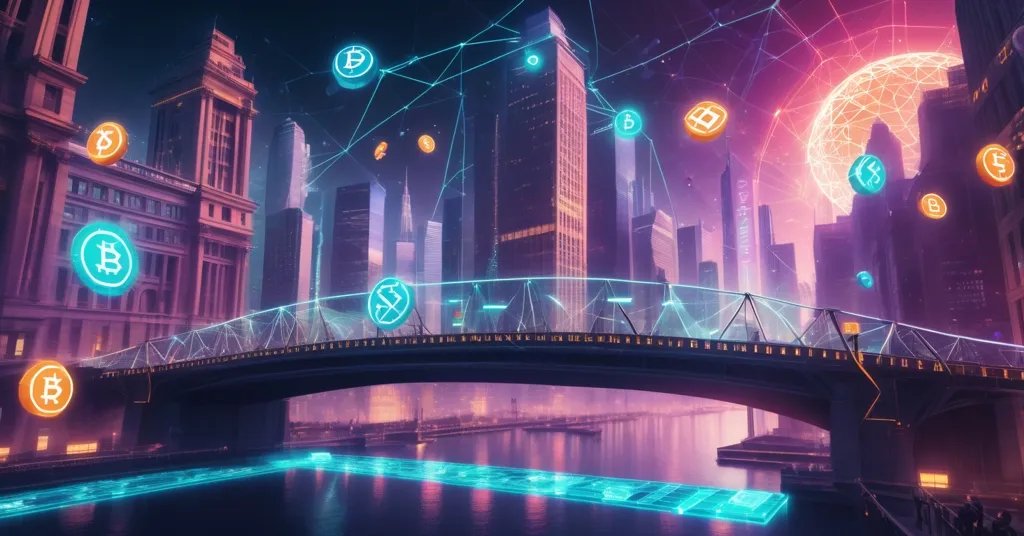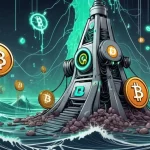Republic and Animoca Brands Tokenize AB1 Shares on Solana for Blockchain Investment Boom

Republic and Animoca Brands Tokenize AB1 Shares on Solana: A Bold Leap for Blockchain Investment
Brace yourselves—Republic, a powerhouse global investment platform, has just announced a groundbreaking plan to tokenize Animoca Brands’ AB1 shares on the Solana blockchain. This isn’t just another crypto headline; it’s a seismic shift that could fuse traditional finance with decentralized systems, giving investors worldwide a chance to own a piece of a Web3 titan while reviving long-dormant assets.
- Bridging Worlds: Republic is tokenizing Animoca Brands’ AB1 shares on Solana, creating new investment avenues.
- Animoca’s Empire: A Web3 leader with 600+ projects, now linking TradFi and DeFi.
- Solana’s Edge: Dominating tokenized stock trading, Solana is a key player in real-world asset innovation.
Tokenization Unpacked: Why It Matters
For those unfamiliar with the term, tokenization is the process of converting ownership of a real-world asset—say, company shares or property—into digital tokens on a blockchain. Picture turning a clunky paper stock certificate into a digital ticket you can trade instantly, anytime, anywhere, without middlemen breathing down your neck. That’s exactly what Republic is aiming for with Animoca Brands’ AB1 shares, which have been sitting idle on the Australian Securities Exchange (ASX) since 2020 due to a mix of market conditions and regulatory headwinds. By digitizing these shares on Solana, Republic could unlock liquidity for an asset that traditional markets have effectively abandoned. As Animoca Brands stated on X, this initiative promises “a new avenue for global investors to gain exposure to Animoca Brands, which boasts a vast portfolio of over 600 leading Web3…” projects.
. @joinrepublic, a leading global investment platform, today announced its plans to tokenize our equity. This initiative by Republic will provide a new avenue for global investors to gain exposure to Animoca Brands, which boasts a vast portfolio of over 600 leading Web3…
But don’t start celebrating just yet. While Republic has opened a waiting list for eager investors, access isn’t a given. Regulatory barriers in certain jurisdictions could slam the door shut on participation, a stark reminder that blockchain’s promise of freedom often butts heads with the iron fist of traditional financial oversight. Compliance with stock market regulators remains a looming question mark, and if you’ve been in this game long enough, you know these gatekeepers rarely roll out the welcome mat for disruptive tech.
Animoca Brands: The Web3 Behemoth at the Center
Animoca Brands isn’t just a name to throw around—they’re a colossus in the decentralized world. With a portfolio exceeding 600 projects across blockchain gaming, NFTs, and other cutting-edge tech, they’ve carved out a reputation as a driving force in Web3. Beyond innovation, they operate as a Tier 3 investment fund, meaning they wield significant capital with a high-risk, high-reward appetite. Their track record speaks volumes: 457 investments with an average return north of 58%. In the past month alone, they’ve jumped into 24 funding rounds, including a jaw-dropping $500 million investment in Solana-based Helius Medical, a firm pushing boundaries in healthcare tech.
What’s particularly striking is Animoca’s blockchain-agnostic approach. While they’ve launched their own network, Moca Chain, they’re not above spreading their bets across ecosystems like Solana and Ethereum. This diversified strategy adds allure to their tokenized AB1 shares—investors aren’t just banking on one project but on a sprawling Web3 empire. Yet, it also begs the question: does such a wide focus stretch their expertise thin, or is it a savvy hedge against the wild swings of this industry? Either way, their involvement lends serious weight to Republic’s tokenization push.
Solana’s Meteoric Rise in Real-World Asset Tokenization
Let’s turn to Solana, the blockchain handpicked for this ambitious venture. In the realm of real-world asset (RWA) tokenization—where everyday assets like stocks or real estate are digitized as tradable tokens—Solana is making a name for itself. The numbers don’t lie: platforms like XStocks on Solana manage over $81 million in assets, with nearly $1 billion in on-chain transfer volume. Even more staggering, total trading volumes across decentralized exchanges (DEXs) and centralized markets hit $4 billion. Most telling? Solana captures 58% of trading volumes for tokenized stocks, outpacing rivals despite trailing Ethereum and Algorand in total tokenized asset value.
So, what’s behind Solana’s edge? It boils down to speed and cost. Transactions on Solana are near-instantaneous and dirt-cheap compared to Ethereum, where high gas fees and slower processing can feel like trading through molasses. This makes Solana a prime candidate for 24/7 trading of tokenized assets, a flexibility traditional markets can’t touch. That said, Ethereum still reigns supreme in total value locked for RWAs, with Algorand not far behind. Solana’s playing a fierce game of catch-up, and partnerships like this with Republic could be the fuel it needs to close the gap.
The Hard Truth: Risks and Regulatory Minefields
Now, let’s cut through the hype with a dose of reality. Tokenization of shares on Solana might sound like the future, but it’s no silver bullet. Regulatory uncertainty is the elephant in the room—will stodgy stock market authorities like the SEC or ASIC embrace blockchain-based assets? Past debacles, like the 2017 ICO boom where countless token sales were crushed as unregistered securities, suggest a rocky road ahead. History shows regulators have a knack for stifling innovation with red tape thicker than a bank vault door.
Beyond that, practical challenges loom. Not every investor is equipped to wade into the murky waters of DeFi to trade tokenized shares. Setting up wallets, navigating DEXs, and dodging the cesspool of scams that plague this space is a steep climb. We’ve seen enough rug pulls and shady schemes to know that blind optimism is a one-way ticket to an empty wallet. Then there’s the jurisdictional mess—Republic’s waiting list might as well be a lottery for those in heavily regulated regions. This clash between blockchain’s borderless vision and TradFi’s iron grip is the fight of our time, and it’s far from won.
Where Does Bitcoin Fit in This Picture?
For the Bitcoin maximalists among us, Solana’s starring role might raise an eyebrow. Why not a Bitcoin layer-2 solution like Lightning or Liquid for this tokenization gig? Truth is, Bitcoin isn’t built for the granular, high-speed demands of RWA trading—its strength is as the unassailable store of value, the digital gold of decentralization. Solana’s lightning-fast transactions and negligible fees make it a pragmatic choice for this specific use case, even if it doesn’t match Bitcoin’s purity on the decentralization front. Let’s not kid ourselves: altcoins like Solana and Ethereum have their roles in this financial revolution, filling niches Bitcoin—perhaps by design—leaves alone. Different chains, different battles, same war against centralized control.
Zooming out, if Republic and Animoca pull this off, it could ignite a broader trend. Imagine other companies tokenizing dormant assets—delisted stocks, illiquid private equity, you name it—bypassing traditional custodians entirely. That’s a direct assault on the brokers and gatekeepers who’ve lorded over finance for centuries. It’s the kind of disruption we live for, even if it’s happening on a chain other than Bitcoin’s.
Key Takeaways and Critical Questions
- What’s the significance of tokenizing Animoca Brands’ AB1 shares on Solana?
It could revive a stagnant asset, enabling global investors to trade 24/7 on blockchain platforms and potentially reshaping access to illiquid shares. - How does Solana stand in the RWA tokenization race?
Solana leads with 58% of tokenized stock trading volume and billions in activity, though it falls behind Ethereum and Algorand in total asset value locked. - What are the major risks of this tokenization effort?
Regulatory pushback could restrict access in many regions, and the complexity of DeFi trading might alienate less tech-savvy investors. - Why is Animoca Brands a key player in this move?
With over 600 Web3 projects and a stellar investment history, Animoca’s influence makes their tokenized shares a compelling opportunity for exposure to the sector. - Can tokenization transform dormant assets in traditional finance?
Potentially, yes—it demonstrates blockchain’s ability to unlock liquidity where TradFi fails, setting a precedent for revitalizing forgotten investments. - What’s the long-term impact on traditional financial systems?
If successful, tokenization could erode dependence on centralized brokers, paving the way for a peer-to-peer financial landscape rooted in decentralization.
Accelerating Disruption: What’s Next?
Taking a step back, this partnership between Republic and Animoca Brands is a window into a future where TradFi and DeFi aren’t just coexisting—they’re colliding. Tokenization stands as a bridge, tearing down barriers that have kept investors locked out of markets for too long. Solana’s involvement isn’t just a tech choice; it’s a statement that newer blockchains are ready to challenge the giants and claim their turf. Animoca’s credibility, with its deep ties to Web3 and venture capital, adds muscle to this experiment.
Of course, the path forward is a gauntlet—regulatory quagmires, tech adoption barriers, and the ever-present threat of market manipulation loom large. But if this succeeds, it’s another chink in the armor of centralized financial tyranny. In the spirit of effective accelerationism, let’s not just cheer from the sidelines—let’s push the pedal down and see how quickly we can upend the status quo. Republic, Animoca, Solana: the ball’s in your court. Prove you’ve got the nerve to outmaneuver the red tape and deliver a win for decentralization.



